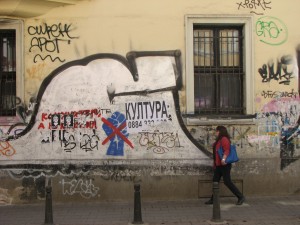Eurodram in Sofia 2015

by Henning Bochert
12 – 14 May 2015
Out of an erratically commencing spring in Berlin, the plane propelled me into the decided warmth of the Bulgarian capital. Sofia was unknown to me, and I was positively surprised by its mixture of thriving small shops, good coffee and food, pavement and trams and tracks crying out for maintenance as well as a flashy new subway line to a flashy new airport. Hardly any tourists.
There was not sufficient mobility funding available to fly in very many coordinators and committee members, so many faces were missing in the discussions. Apart from Dominique Dolmieu, Eurodram founder and chief coordinator, the German and the French committees (Ulrike Syha and Gilles Boulan respectively) were somewhat stronger represented, then there were Andreas Flourakis from the Greek committee, Hakan Silahsizoglu from the Turkish, Bleuenn Isambard from the Russian, Neda Nezhdana from the Ukrainian and Karine Samardžija from the committee for Serbia, Bosnia, Croatia and Montenegro. The host for the event was Gergana Dimitrova of the Bulgarian committee, which was also strongly present. In addition, there were some guests from Gergana’s theater ensemble 36monkeys.
Unfortunately, I missed the discussions on the first day on the individual committees’ work since the last conference in 2014, as well as the welcome speech by the renowned Bulgarian playwright Hristo Boychev. On the second day, the committees presented their selection of plays of 2015 in greater detail. It was this step that pointed my attention to the other committees’ selections and thus rendered the appropriate meaning to it; to merely read the list of the selected titles on the Eurodram website at sildav.org was, of course, insufficient to meet the goal set forth in the mission statement: to raise public attention and interest in international playwriting. I made a note of a few titles that sounded particularly interesting to me, e. g. the play by Robin Soans in the Greek selection, the French play PENSE QUE TU ES DIEU by Matthieu Viscniec or MARILYN MONROE: TRIUMPH AND AGONY of the Bulgarian playwright Dimitar Hristov (both Ukrainan selection). For the German committee, we had an opportunity to once again point out our selection of the Massini, Sikorska-Miszczuk, and Tryti Vennerød plays and to explain what, in our opinion, made these titles excel.
We used the time in between the scheduled talks to split in smaller groups and eat in backyard restaurants, getting to know each other better, and continue the discussions. Excursions into the city helped us get an impression of our surroundings. We saw the chic traditional uniforms on the guards in front of the president’s office, and right behind it, we stumbled over the Christian St. Georgi Rotunda, a church from the fourth century, as well as the largest synagogue in Bulgaria, a wonderful Orthodox church (St. Nedelya) and strangely messed-up concrete tunnel architecture in the city center.
During the next session, we mentioned that the committees are set up very differently and due to their differing size, they are more or less capable to do the work. Some committees have many active members, e. g. the French one. Others list a large number of nominal members while they are in fact largely inactive, e. g. the Russian one. Others have few members and no coordinator, e. g. the one for Hebrew or that for Nordic languages (which should probably be split in several committees anyway, e. g. in Scandinavian and Baltic languages). Others have very few members, e. g. the one for Serbian-Croatian-Bosnian-Montenegrin, the Dutch, the Armenian, or that for Romanes. This should indeed be understood as a wake-up call for anybody interested and able to become active here.
Next, we discussed the various measures to be taken to make this year’s selections publicly visible, too, and to advertise the selected plays and disseminate them. We agreed that to this end, Eurodram urgently requires a more appropriate website of its own and how that could technically be achieved. Ideally, the respective committees should build websites of their own to avoid that their work evaporates into thin air but to make details about content, languages, style of the plays, about playwrights and translators and, if applicable, agencies, available and searchable online. In case the copyright is not represented by an agency and the playwrights agree to it, the play text could be made directly available through these sites.
Inside a former club space underneath the NDK, the National Palace of Culture, we heard a staged reading by 36monkeys. The audience followed the presentation of the play – MICHAL, TIGRESS OF THE CITY, by the Romanian playwright Gianina Cărbunariu – along a creatively designed path within the vast venue. It was inspiring to see how the “monkeys” projected their lines via teleprompter directly on the wall behind the audience, thus enabling the actors to move around freely and address the audience.
We left the most difficult topic, fundraising, to the very end of the event and decided that we urgently need to apply for EU funds (mobility, workshops, translations). We further decided that an experienced person could be hired for this task with the help of funds raised out of or by the individual committees (privately or otherwise). To find solutions in this respect, we nominated a special committee.
The next convention is scheduled to take place in Istanbul in 2016, and for 2017, the Portuguese committee, via Skype, indicated their interest to organize one in Lisbon.
We owe much thanks to our Bulgarian hosts and colleagues Gergana Dimitrova, Adi Kuneva, Katrin Hrusanova, and Dimitar for making the entire event possible.
Leave a Reply